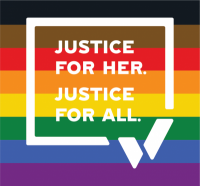Abortion rights, women of color, and LGBTQI+ people are under attack. Pledge to join us in fighting for gender justice.
Queer Representation Matters, and Not Just on TV

Growing up, queer representation in media, and particularly on television, allowed me to expand my imagination, to see myself as anything other than straight. It’s what allowed—encouraged, actually — me to reevaluate my needs and myself.
The idea that representation in film, tv, books, and other media is important is fairly well studied and understood. Broadly, diverse representation of race, gender, sexual orientation, religion, age, and more helps people understand themselves, feel more secure and welcomed, and gives them the security of knowing they’re not alone.These same benefits of representation in media and entertainment apply to advocacy, too. That’s why queer representation matters when we talk about birth control.
I think of it kind of like I think of the census (or rather, how the census is supposed to work, since right now the Trump administration is trying hard to make sure some populations aren’t counted). The way the census is meant to work is that the government surveys the population to see what our demographics and needs are, then allocates resources accordingly. If the government doesn’t know a need exists — doesn’t realize that a certain population is in need of enhanced services in a specific area — it can’t meet that need.
Similarly, if advocates don’t know a certain population is in need of something, they can’t meet that need, either. As a queer person who uses birth control and works on birth control advocacy, here’s what I’ve learned: Many people don’t know that queer people need birth control. That lack of awareness — though intangible — has real effects. It means that our advocacy is less likely to have messaging that resonates with queer people. It means that queer people may be less aware of their options and rights when it comes to birth control. It means that powerful people who make decisions about birth control accessibility don’t consider the needs of queer people. What it means, ultimately, is that queer people may face even more barriers to the health care they need.
Here is a non-exhaustive list of reasons why queer people need birth control: To have sex without getting pregnant. To help treat medical conditions like endometriosis and PCOS, the latter of which may have higher rates among queer women than non-queer women. To help transmasculine people handle body dysmorphia by reducing the frequency of their periods. To help, period.
If you’re an organization or person who believes that everyone should have access to the birth control they need, here’s a non-exhaustive list of things you can do: Highlight birth control stories from LGBTQ people (and not just during pride month, but as a regular part of your work around birth control). Collect information around sexual orientation and gender identity (by consent only) to use to inform your work. Then actually let it inform your work. Create queer-specific and culturally competent programming and materials that will speak to queer people. Use language that affirms that people of all genders need birth control.
If we’re not representing queer folks in our birth control advocacy work, we’re likely hampering their ability to understand and get the birth control they need. If our work doesn’t proactively tell the story of how queer people need birth control, we’re reinforcing the idea that queer people need not be considered. If all of our materials explaining the birth control benefit (and how you can and should be getting your birth control without any out-of-pocket costs!) lack any queer relationships, how are queer people supposed to see themselves in our work? Our job is to make it easier for all people to get the health care they need—and ‘all’ includes queer people.
Queer representation in film and television is how I discovered my identity, and ultimately found the support I needed to live my life truly and happily. Let’s not allow lack of representation in birth control advocacy be just another barrier LGBTQ people must face.

